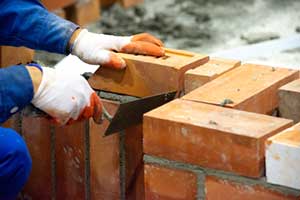Unlocking the Keys of Lasting Masonry Building And Construction Practices for Eco-Friendly Buildings
Among the myriad approaches to eco-friendly structure, lasting masonry building and construction stands out as a reliable and resilient technique that holds a wealth of untapped potential. From the option of products to cutting-edge building and construction techniques, the secrets to accomplishing sustainability within masonry building are multifaceted and appealing.
Advantages of Sustainable Masonry Building And Construction
Accepting sustainable stonework building methods not only minimizes environmental impact yet likewise offers lasting economic advantages to home builders and communities. By making use of materials like recycled blocks, obstructs, and stones, contractors can considerably reduce the carbon footprint of their tasks while advertising source performance. In addition, lasting masonry construction methods, such as correct insulation and thermal mass homes, can enhance power performance within structures, causing lowered operational prices over time.
Moreover, the toughness and resilience of stonework frameworks add to long-lasting financial benefits. Buildings created using lasting stonework practices commonly require much less maintenance and repair work, equating to set you back financial savings for building contractors and homeowner. The long life of masonry products likewise ensures that frameworks continue to be secure and protected, lowering the demand for frequent restorations or substitutes.
Eco-Friendly Stonework Products
Making use of environmentally friendly stonework products is a pivotal step towards enhancing the sustainability of construction practices and lessening environmental effect while making the most of long-term financial benefits. Sustainable stonework products are sourced, created, and made use of in a way that lowers general environmental influence. Sustainable concrete blocks integrate recycled accumulations and may feature enhanced insulation buildings, contributing to energy performance in structures.
In addition, all-natural products like adobe, rammed earth, and straw bales provide excellent thermal mass properties, minimizing the requirement for home heating and cooling down power. These products are often locally available, promoting local economies and minimizing transportation-related carbon emissions. By picking green stonework materials, construction jobs can dramatically decrease their environmental footprint and add to the development of much healthier, much more lasting built atmospheres.
Energy-Efficient Masonry Strategies
Power efficiency plays an important function in boosting the sustainability of stonework building and construction methods. By carrying out energy-efficient stonework techniques, contractors can significantly lower the general power consumption of a structure, leading to reduced functional expenses and a smaller environmental impact. One essential energy-efficient masonry strategy is making use of thermal mass, which entails incorporating dense products like concrete or brick right into the building's structure to soak up and keep heat. This helps control indoor temperature levels, decreasing the need for mechanical home heating and cooling systems.

Advancements in Sustainable Stonework
Recent developments in lasting masonry practices have caused innovative techniques that are reshaping the building and construction sector. One such advancement is the growth of self-healing concrete, which utilizes microorganisms installed within the concrete to heal cracks autonomously. This innovation not just reduces upkeep expenses but likewise boosts the sturdiness of masonry structures, contributing to their sustainability.
Another noteworthy advancement is making use of recycled aggregates in stonework construction - masonry contractor. By including materials such as smashed ceramic waste or recycled glass right into concrete blends, builders can decrease the environmental influence of building and construction projects while preserving architectural honesty. This technique not just diverts waste from land fills but also saves natural resources, making it a key innovation in lasting masonry building and construction
Additionally, the combination of digital layout devices, such as Building Information Modeling (BIM), is changing the way masonry frameworks are intended and created. BIM permits even more precise computations, reduced material waste, and improved energy effectiveness, eventually leading to more sustainable structure practices. These advancements collectively represent an encouraging future for sustainable stonework building in the era of green buildings.
Future Trends in Stonework Sustainability
With the ingenious strides made in sustainable stonework practices, the future fads in masonry sustainability are positioned to additional revolutionize the building sector. One of the key patterns shaping the future of masonry sustainability is the increased integration of technology. Developments such as Building Details Modeling (BIM) and digital truth simulations are being used to enhance stonework building procedures, leading to minimized material waste and improved power efficiency in structures.
Furthermore, the advancement of unique lasting materials is established to play a considerable role in boosting the eco-friendliness of masonry construction. masonry contractor. Developments like self-healing concrete, recycled aggregates, and cocrete bio-based binders are getting grip for their ability to minimize environmental influence while keeping architectural honesty

Conclusion
In verdict, sustainable stonework construction techniques provide many benefits for eco-friendly buildings. masonry contractor. Advancements in lasting masonry are continually being established to additionally enhance the environmental efficiency of natural stone stamped concrete buildings.